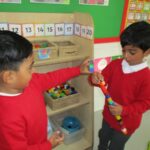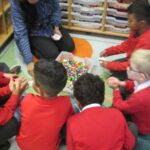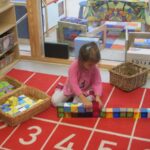At Woodgrange Infant School we follow a mastery approach to maths teaching. We believe that mastery of mathematics is achievable for all children. In order to master core concepts of mathematics, we slow down the pace of learning and we break it into small, sequential steps to allow for learning that is both deep and sustainable. Our maths teaching provides children with ample opportunities to:
- Explore and investigate a range of ideas, skills and strategies
- Rehearse, practise and apply skills learnt
- Communicate ideas in full sentences to explain mathematical thinking and strategies
- Problem solve and develop reasoning skills
- Cooperate with learning partners to learn from and to support each other
- Take risks and try out new skills
- Pattern spot and make connections to prior learning
Maths in the Early Years Foundation Stage 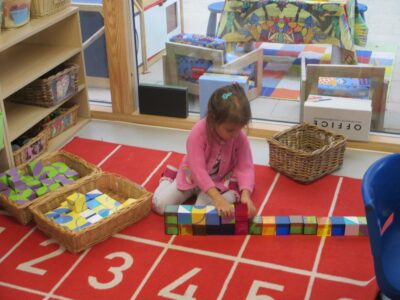
All children in the EYFS follow a broad-based curriculum and have a wide range of opportunities to explore mathematical concepts; both planned and self-initiated inside and outdoors. Children also take part in whole class and group activities designed to develop mathematical language and concepts.
Children learn about number, (subitising, counting, composition and comparison) as well as shape, space and measures.
Assessments are observation based and inform planning to build on prior knowledge and understanding.
Maths in Key Stage 1
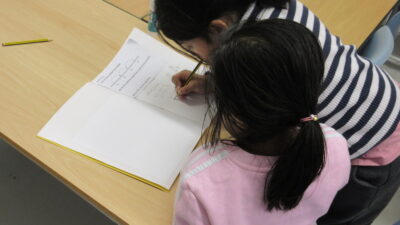 Children have a daily maths lesson. Over the year they learn about:
Children have a daily maths lesson. Over the year they learn about:
Numbers and place value- the position and value of digits
Calculations- addition, subtraction, multiplication and division, including with money
Fractions- halves and quarters
Measurement of length, weight, capacity, time
Shapes- properties and movement- such as quarter turns
and for Year 2 simple statistics- interpreting graphs and tables
Each term children are given opportunities that include:
- practical activities
- consolidation and practice of fundamental skills and routines
- individual, group and whole class discussions and activities
- problem solving
- mathematical investigations
Mathematics is used, applied and developed through activities in other areas of the curriculum where appropriate e.g. the use, recording and analysis of measurement skills in Science and Design technology.
How do we assess maths?
We use a wide range of strategies to inform us about progress including:
– Observing children working
– Talking to and questioning children in groups, as a class or individually
– Marking recorded work and discussing with the children
– Reviewing recorded independent work
These assessment strategies inform learning and progress in the short term.
Children’s work is assessed against the objectives for the year group as set out in the National Curriculum. Progress is tracked and evaluated to:
- identify pupils in need of either support or extension
- identify areas of difficulty or areas of strength in terms of teaching or curricular provision
- set new targets for learning which are shared with pupils
This evidence contributes to the overall picture of achievement for each child.
IMPORTANT FOR PARENTS
At this stage children need to focus on calculating practically with objects and recording as either pictures or simple number sentences such as 6 + 5= 11 or 5 x 4= 20.
We do not introduce more formal written calculations at Woodgrange. This is something they meet much later on.
Please speak to your class teacher for advice.
For more ideas and information please see these leaflets:
Maths games to build fluency KS1
Helping your child with their maths learning in Key Stage 1

